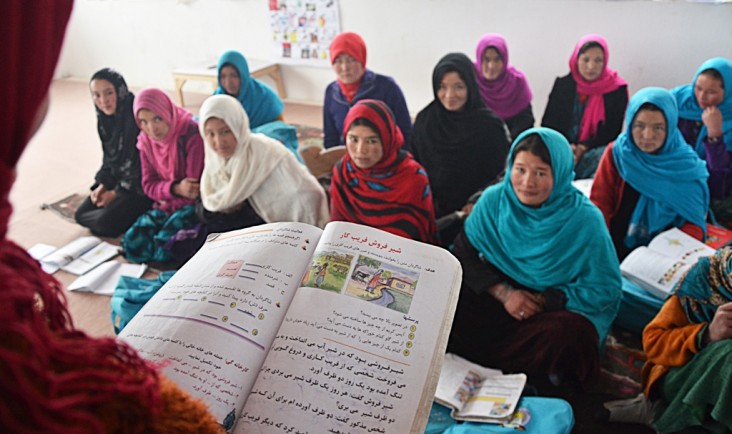Speeches Shim

Our Work
Afghanistan has one of the youngest populations in the world, making quality education particularly critical for the rapidly growing numbers of schoolaged boys and girls. As more Afghans attend school and seek skilled employment, there is a growing demand for textbooks, learning spaces, trained teachers, and innovative approaches that prepare young Afghans to join the workforce. From primary school to the university level, USAID is strengthening processes and institutions to ensure that all children have an opportunity to learn.
Major Highlights
- Over 9 million children are enrolled in school (including over 3.5 million girls), and public and private universities enroll around 300,000 students, including around 100,000 women according to the Afghan Ministry of Higher Education.
Since 2008:
- USAID printed and distributed more than 170 million textbooks to schools.
- USAID trained more than 480,000 teachers.
- USAID enrolled over three million Afghan girls in community-based education classes.
Recent Highlights
In 2017 and 2018:
- USAID supported the establishment of 8,440 community-based education and accelerated learning classes, ensuring more than 171,300 children accessed quality education, representing 53.3% girls.
- Through the Afghan Children Read activity, USAID established early grade reading pilots in Kabul, Herat, Nangarhar, and Laghman.
- USAID equipped more than 2,175 teachers, including 708 women, with education professional development training.
- USAID trained more than 3,000 school principals and administrators, including 561 women, in basic school management.
- More than 850 women received full-tuition scholarships to study bachelor’s and master’s level degrees through USAID’s Promote Scholarship program.
- In partnership with 13 U.S. universities, USAID assisted 11 public Afghan universities to improve existing and establish new degrees in the schools of business, medicine, psychology, communications, engineering, information technology, education, and agriculture.
Improving Basic Education
USAID supports improving the quality of basic education by helping to train teachers, produce quality learning materials, distribute textbooks, and by strengthening the Ministry of Education’s ability to administer a nationwide educational system.
Supporting Higher Education
USAID is helping Afghans to pursue higher education and vocational training opportunities that will equip them with the knowledge and skills they need to meaningfully contribute to the workforce.
Current Projects:
- Education Quality Reform in Afghanistan (EQRA)
- Textbook II Printing and Distribution Project
- Higher Education Development Project (HEDP)
- Capacity Building Activity (CBA)
- Afghan Children Read Program
- American University of Afghanistan (AUAF)
- Increasing Access to Basic Education and Gender Equality (CBE)
- Promote - Scholarship
- Strengthening Education in Afghanistan II (SEA II)
- Global Partnership for Education (GPE)
- University Support & Workforce Development Program (USWDP)
Completed Projects:
- Textbook Printing and Distribution
- Education Quality Improvement Program (EQUIP II)
- Early Grade Reading Survey (EGRS)
- Assessment of Learning Outcomes and Social Effects of Community-Based Education (ALSE)
- Afghan eQuality Alliances (AeQA)
- Afghanistan Primary Education Program (APEP)
- Afghanistan Technical Vocational Institute (ATVI)
- America's Rapid Response to the Education Needs of Afghanistan
- Building Education Support Systems for Teachers (BESST)
- Design for Ghazi Boys and Kabuli Sardar Girls High Schools
- Establishment of Management Services for the American University of Afghanistan
- Faculties of Education
- Higher Education Project (HEP-2)
- Higher Education Project (HEP)
- International School of Kabul (ISK)
- Kabul Schools Program
- Learning for Community Empowerment Program (LCEP-2)
- Literacy & Community Empowerment Program
- National Men’s Dormitory
- Partnership for Advancing Community Education in Afghanistan (PACE-A)
- Rehabilitation of Women's Dorms - University of Kabul
- Skills Training for Afghan Youth (STAY+)
- Special Initiatives in Education
- Strengthening Education in Afghanistan (SEA) Project
- Textbook Printing
- Youth Empowerment Project


Comment
Make a general inquiry or suggest an improvement.